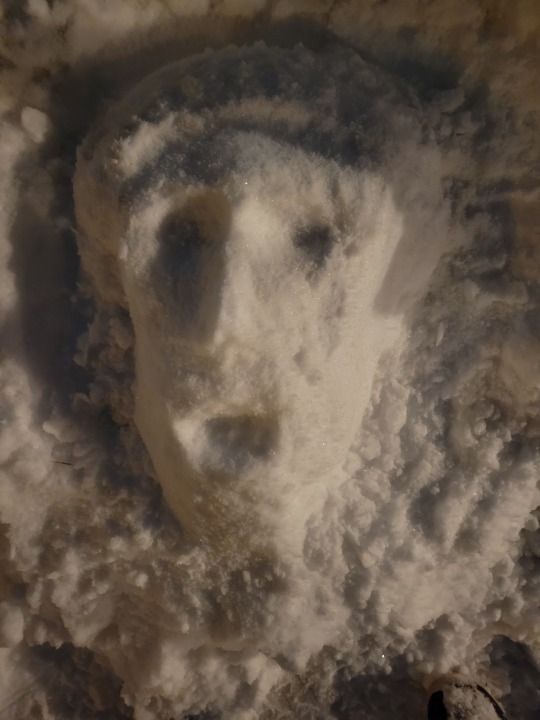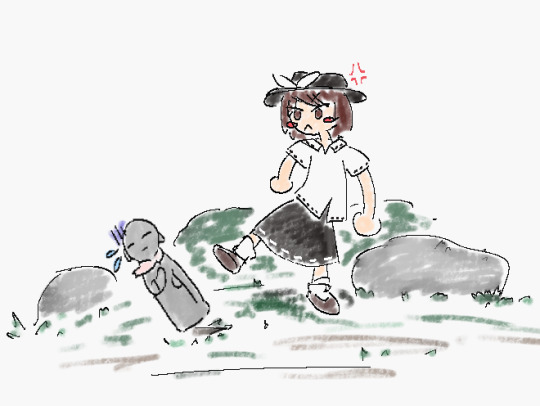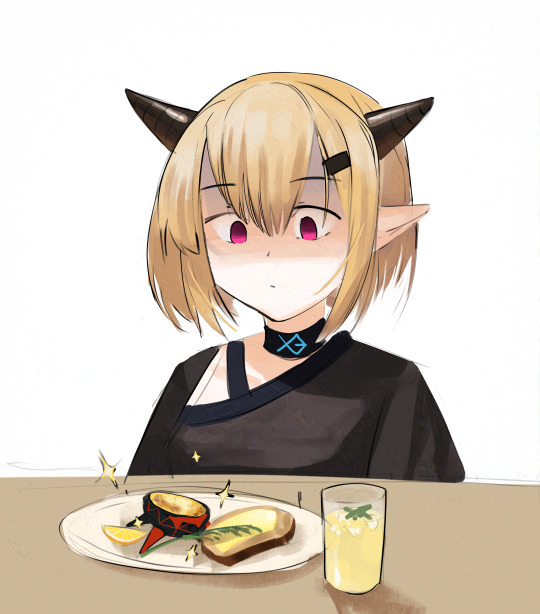Don't wanna be here? Send us removal request.
Text
Part 2: On the less satisfying side, but still well done, is the Exemplars/Victorian/Taran side. Less satisfying on a few accounts. One, they still lack a coda, a closing statement of sorts, which the event Ending a Grand Overture will presumably cover. Two, I am not a big fan of the war scenes in Arknights, but that is mainly a function of the fact that I have read very few satisfyingly written action scenes. That said, I did enjoy the ride through reverse Arthurian story for Siege and her gang. The idea of the sword wielder needing the power of all her friends/allies so she can put the sword back into the pedestal is neat. After all, when you strip the symbolism of its authority, all the sword is is a key to a mystery artifact, it doesn't confer any magical power of authority, but it could help Siege help others. I also think the way Dublinn used the current conflict to create a no win scenario for the Dukes, and gain independence that way was pretty cool and a logical end scenario. The result of the war neatly integrates the Reunion side, even if not well covered, as presumably now, thanks to the Shard, everyone is infected, and now Reunion can obtain a real foothold with an actual power base. As for the loose ends/unsatisfying ends, I am just going to put them in a list: -I am not sure at all what Chen did to contribute. Her character was a dead end in terms of the story. -The final chapter of the arc was the last place that one should introduce a new character focus, I think Nadine was pointless. -While I liked Ascalon story, I think it would have been dramatically more effective for her to succeed in killing off Manfred, and bring the Babel stuff full circle. -I was happy with the result of the Shining/Nightingale/Nearl story, and neatly slotted in with the overall point of the story, but it definitely needs a coda. Future Followers event perhaps? -Mandragora was handled weirdly post chapter 9, and it sort of feels like her arc was aborted. Honestly would have preferred she lived. -Maybe this is asking for too much, but I would like to see an independent Tara event. While I can see where Victoria is headed, for Tara, I am left with a, "now what", feeling. So, in the wider context, I am going to be real, in terms of the mechanics of the story, my personal best ones are Babel, followed by chapter 11 and Firelight, since they are very cohesive, focused stories. But emotionally, chapter 14 really worked for me, so maybe it goes second personal favorite in the Victorian arc. So was the Victorian arc overall worth it? To me, it resonated, so it was worth it. ps. I couldn't find room in the write up to mention it, but Near dropping from the sky to save her girlfriends was very hype. The Followers are my Arknights ot3 lol.
Part 1: A bit LTTP, but I have been mulling over chapter 14 of Arknights, and thoughts have crystallized. My first reactions to the story was pretty positive, as a lot of the emotional beats worked on me, but I did wonder whether it worked as a whole.
Now, the Victorian arc was very ambitious, at times overly so. I think it's safe to say there are a few dead ends and turn backs in the story as the writing group tried to figure out how to handle this behemoth of a premise. It's the writing group's attempt to create a fictional civil conflict with a foreign invasion, which if you have followed any real life conflicts like that, they are actually extremely complicated and confusing to follow. While I personally like the attempt, it is not going to endear a lot of people to the storyline, and the story does creak at its attempt at juggling the details of a billion different things. It is also not helped by the fact that I think chapter 9 and 10 were both pretty messy introductions to the conflicts for different reasons for me personally. Chapter 11-14 though, each tries to bring focus to the story by aiming for a specific theme, each ending bringing the end of certain storylines to simplify the situation. In addition, you have Firelight and Babel bringing in much needed context. So, with all that in mind, chapter 14: Absolved will be the Seekers, the end of the Victorian arc, had a grand assignment. It has to close all the remaining different stories in a satisfying manner, all following an overarching theme that will satisfy its own story, but also the wider six chapter arc. It has to cover the fallout from Babel and integrate the inevitable exposition dump on the truth of originium into the wider emotional truths of the arc and the series. It has to create a rational geopolitical result for the status quo change for the Sarkaz, the Exemplars, the dukes, Dublinn, and even in a minor way, Reunion even if chapter 13 for the most part concluded its story.
So for my part, they have managed to land the plane pretty well, with a few rough spots aside. The best handled storyline is the one on the Sarkaz side. It was a good idea for Wisadel to be the emotional anchor to the overall theme of generational trauma, fate, and inheritance. She is kind of the main character of the chapter, along with Amiya and Siege. Her moment to moment dialogue is pretty funny, and her dynamic with Mon3tr and Doctor are some of the most fun I had reading this chapter. Really though, she has great dramatic moments too. I got emotional to her finally processing her grief over Theresa, and her finally getting to properly talk with Theresa in the assimilated universe. I find her character arc is beautiful, she inherited a weapon of war and got her name via war, but now she is given a hopeful name and inherits Theresa's ideal. Maybe the intent is, some day, Kazdel can follow her story writ large.
On the Theresa side of the story, she takes ownership of the fates of the Sarkaz by exorcising the Myriad Souls, the literal manifestation of generational trauma via scifi mystery technology. I found the actual concept of the myriad souls terrifying actually, a reality where some data of you is forever reliving the same trauma, and then passing that on to your descendant. The fact that seeing the truth of the myriad souls pacifies the Revenant, who ironically, his entire life was spent living in a similar state and jealous of those who passed on, was low key but very effective in driving that home. Anyways, I think it's interesting that Theresa after death chose to be ruthlessly pragmatic, and backed Theresis in exchange for being able to do this. This makes her reunion with Rhodes Island both sweet and tragic. And god do they milk the drama for all it's worth, with my personal favorite moment being the moment Amiya reveals how she knew who betrayed Babel the whole time, and that she has been grappling her image of who the Doctor is. As an aside, I really love Logos in this. He is badass, idealistic, a goof, and takes his responsibilities very seriously. A representative of sorts of the new generation of Kazdelians raised with different ideals via Theresa's new educational system back then, and now having the means to fight for the new ideals.
Wisadel and Theresa's stories, along with all the other stories: of Shining, the anecdotes of the previous kings of Sarkaz, the Revenant, Ascalon, Hoderer, and all the personal stories of all the Sarkaz from all walks of life from this chapter and Babel paint a very complex and complete picture of the Sarkaz. I don't know if the Sarkaz were perfectly executed through the whole series, as I wasn't sure how a depicting a group of people without a safe homeland that have parallels to a lot of marginalized groups in real life, as monstrous would go over. Especially in chapter 10, which sort felt like an Arknights Halloween episode (it was released in October!). Currently, I do find them to be very diverse culturally and philosophically, and very nuanced in how they are depicted. Especially when you see in relation to how monstrous the other nations are in their conducts, which unfortunately, is way too real. Anyways, my one take is, it's best not to compare them to any specific groups in real life, but rather take the generalities of the concept of homelessness and how wider society view those people. (There is also an interesting parallel to how the Tarans, another marginalized group in Arknights, also use the spectre of death to achieve their liberation goals, but I don't have the brain space to unpack that)
24 notes
·
View notes
Text
Part 1: A bit LTTP, but I have been mulling over chapter 14 of Arknights, and thoughts have crystallized. My first reactions to the story was pretty positive, as a lot of the emotional beats worked on me, but I did wonder whether it worked as a whole.
Now, the Victorian arc was very ambitious, at times overly so. I think it's safe to say there are a few dead ends and turn backs in the story as the writing group tried to figure out how to handle this behemoth of a premise. It's the writing group's attempt to create a fictional civil conflict with a foreign invasion, which if you have followed any real life conflicts like that, they are actually extremely complicated and confusing to follow. While I personally like the attempt, it is not going to endear a lot of people to the storyline, and the story does creak at its attempt at juggling the details of a billion different things. It is also not helped by the fact that I think chapter 9 and 10 were both pretty messy introductions to the conflicts for different reasons for me personally. Chapter 11-14 though, each tries to bring focus to the story by aiming for a specific theme, each ending bringing the end of certain storylines to simplify the situation. In addition, you have Firelight and Babel bringing in much needed context. So, with all that in mind, chapter 14: Absolved will be the Seekers, the end of the Victorian arc, had a grand assignment. It has to close all the remaining different stories in a satisfying manner, all following an overarching theme that will satisfy its own story, but also the wider six chapter arc. It has to cover the fallout from Babel and integrate the inevitable exposition dump on the truth of originium into the wider emotional truths of the arc and the series. It has to create a rational geopolitical result for the status quo change for the Sarkaz, the Exemplars, the dukes, Dublinn, and even in a minor way, Reunion even if chapter 13 for the most part concluded its story.
So for my part, they have managed to land the plane pretty well, with a few rough spots aside. The best handled storyline is the one on the Sarkaz side. It was a good idea for Wisadel to be the emotional anchor to the overall theme of generational trauma, fate, and inheritance. She is kind of the main character of the chapter, along with Amiya and Siege. Her moment to moment dialogue is pretty funny, and her dynamic with Mon3tr and Doctor are some of the most fun I had reading this chapter. Really though, she has great dramatic moments too. I got emotional to her finally processing her grief over Theresa, and her finally getting to properly talk with Theresa in the assimilated universe. I find her character arc is beautiful, she inherited a weapon of war and got her name via war, but now she is given a hopeful name and inherits Theresa's ideal. Maybe the intent is, some day, Kazdel can follow her story writ large.
On the Theresa side of the story, she takes ownership of the fates of the Sarkaz by exorcising the Myriad Souls, the literal manifestation of generational trauma via scifi mystery technology. I found the actual concept of the myriad souls terrifying actually, a reality where some data of you is forever reliving the same trauma, and then passing that on to your descendant. The fact that seeing the truth of the myriad souls pacifies the Revenant, who ironically, his entire life was spent living in a similar state and jealous of those who passed on, was low key but very effective in driving that home. Anyways, I think it's interesting that Theresa after death chose to be ruthlessly pragmatic, and backed Theresis in exchange for being able to do this. This makes her reunion with Rhodes Island both sweet and tragic. And god do they milk the drama for all it's worth, with my personal favorite moment being the moment Amiya reveals how she knew who betrayed Babel the whole time, and that she has been grappling her image of who the Doctor is. Anyways, the Rhodes Island side unpacks the legacy Theresa left behind, how they are carrying on with her legacy despite the previous bad end, and how they have to move beyond her. As an aside, I really love Logos in this. He is badass, idealistic, a goof, and takes his responsibilities very seriously. A representative of sorts of the new generation of Kazdelians raised with different ideals via Theresa's new educational system back then, and now having the means to fight for the new ideals.
Wisadel and Theresa's stories, along with all the other stories: of Shining, the anecdotes of the previous kings of Sarkaz, the Revenant, Ascalon, Hoderer, and all the personal stories of all the Sarkaz from all walks of life from this chapter and Babel paint a very complex and complete picture of the Sarkaz. I don't know if the Sarkaz were perfectly executed through the whole series, as I wasn't sure how a depicting a group of people without a safe homeland that have parallels to a lot of marginalized groups in real life, as monstrous would go over. Especially in chapter 10, which sort felt like an Arknights Halloween episode (it was released in October!). Currently, I do find them to be very diverse culturally and philosophically, and very nuanced in how they are depicted. Especially when you see in relation to how monstrous the other nations are in their conducts, which unfortunately, is way too real. Anyways, my one take is, it's best not to compare them to any specific groups in real life, but rather take the generalities of the concept of homelessness and how wider society view those people. (There is also an interesting parallel to how the Tarans, another marginalized group in Arknights, also use the spectre of death to achieve their liberation goals, but I don't have the brain space to unpack that)
24 notes
·
View notes
Text
Whenever I see a discourse on the Fermi paradox, every time someone mentions stuff like "self replicating nanobots", "Dyson sphere", "Kardashev scale", and "The Great Filter", a nephron in my kidney dies out of cringe.
#science#astronomy#Fermi paradox is fine as a thought experiment but good god#people do not understand scale#what is up with the assumption of exponential energy usage for advanced civilizations
0 notes
Text
Recently got my PhD in physics, woooooo. Anyways, my topic was on debris disks and I just feel like sharing a cool video about it.
youtube
18 notes
·
View notes
Text

Saying "voting doesn't matter" might reach your younger peers online but it certainly hasn't reached Clangus Hargbarg who was part of the kkk in 1951 and still sends in his ballot. He hasn't missed a one.
134K notes
·
View notes
Text
I guess I want to comment on one aspect of chapter 13 that I don't know if people discussed a lot. Anyways, spoiler ahead for 13-16. -
-
-
-
-
Somehow Guard's death has become the most emotional impactful for me personally for the series. There is the fact that I have liked seeing his progress from chapter 7 and onwards (his story began in Operational Intelligence though, if I remember correctly), and I eagerly looked forward to his appearances. There is also the fact that he was our connection to Reunion, someone from our side who found a reason for why that organization better served his ideals. In combination with that though, it's the pure dramatic irony of his death, it's such a punch in the gut. After being saved by Scout, after everything he's been through and joining the Reunion movement to help the infected via a solidarity movement, he dies trying to save a pile of medicine ingredients that a non infected pretending to be Reunion gathered, from an incident caused by two infected, who killed an infected Sarkaz from prejudice and trauma, in a place formerly run by infected, the inhabitants of which had hoped for a rumored nomadic city run by the infected that does not exist. Man, the tragedy, it hurt so good. Rest in peace Guard, you were always a real one. Anyways, chapter 13 ranks third in Victoria arc for me (2nd is Firelight, 1st is chapter 11).
26 notes
·
View notes
Text
christianity as a whole is kind of weird to me because jesus died for your sins, right, but then you go on thinking that you can't sin anyway? am i understanding this correctly? i feel like the entire concept of rules for behavior goes kind of counter to jesus' sacrifice & the point of your religion?
86 notes
·
View notes
Text
My attempt at a screaming snow Odo from Star Trek: Deep Space Nine:

1 note
·
View note
Text
Astronomy acronym of the day: Jupiter Mass Binary Objects, or JuMBOs. Which you can learn more about here:
youtube
0 notes
Text
youtube
Video on what to do to learn physics by physics channel acollierastro. I agree on nearly everything in it in terms of the recommendations. Glad someone called out Griffith's being a bad book for learning quantum. I also agree that Feynman's lecture is not good for learning even if the pedagogy is good, it is good for coming back to material and trying to get a better perspective on things. Love the shoutout to Landau and Liftshitz, they are great books for professionals who want a unique, rigorous perspective on theoretical physics. Also glad she talks about a book on error and uncertainty because physics is a science, not math, and emphasizing that is important. I highly disagree that Jackson is readable though. It is a good reference book and has good difficult problems, but it's not a good read at all. Also I would add that learning some analysis, complex analysis, and abstract algebra is useful, especially for QFT.
0 notes
Text
youtube
Not sure why the english Arknights site didn't release Blues with You to accompany the Lonetrail event, but this video deserves one more chance in the spotlight.
12 notes
·
View notes
Text

Baldur's Gate 3 writer liked Lone Trail, that's neat. Stole the tweet from here
61 notes
·
View notes






